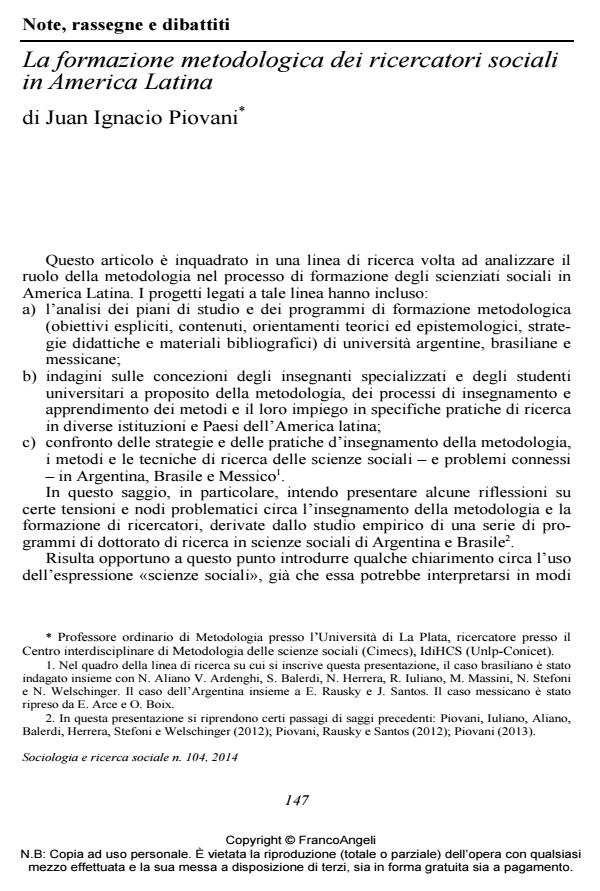Methodological Training of Social Scientists in Latin America
Journal title SOCIOLOGIA E RICERCA SOCIALE
Author/s Juan Ignacio Piovani
Publishing Year 2014 Issue 2014/104
Language Italian Pages 10 P. 147-156 File size 51 KB
DOI 10.3280/SR2014-104007
DOI is like a bar code for intellectual property: to have more infomation
click here
Below, you can see the article first page
If you want to buy this article in PDF format, you can do it, following the instructions to buy download credits

FrancoAngeli is member of Publishers International Linking Association, Inc (PILA), a not-for-profit association which run the CrossRef service enabling links to and from online scholarly content.
This article discusses some problems related to methodological training in the social sciences and the ways in which they are «solved» in the university teaching of methodology in Argentina and Brazil. The ideas presented here are based on empirical research focused on: a) the analysis of curricula and syllabuses (objectives, contents, theoretical and epistemological orientations, instructional strategies and bibliography), b) the investigation into the conceptions of professors and students about methodology, the processes of teaching and learning methods and their use in specific research projects, c) the comparison of the teaching strategies of methodology - and related issues - in the countries analyzed.
- S.F. Alatas (2003), «Academic Dependency and the Global Division of Labor in the Social Sciences», Current Sociology, LI, 6, pp. 599-613, DOI: 10.1177/00113921030516003
- E.S. Bogardus (1918), Making Social Science Studies, Los Angeles, Jesse Ray Miller Press.
- E.S. Bogardus (1926), The New Social Research, Los Angeles, Jesse Ray Miller.
- A. Bruschi (1991), «Logica e metodologia», Sociologia e ricerca sociale», XII, 35, pp. 30-55.
- A. Bryman (1988), Quantity and Quality in Social Research, London, Routledge.
- S.F. Chapin (1920), Field Work and Social Research, New York, Appleton-Century.
- N.R. Cohen et al. (2008), Problematizando la metodología de la investigación como campo disciplinar, in N.R. Cohen, J.I. Piovani (ed.), La metodología de la investigación en debate, La Plata, Edulp-Eudeba.
- H. Delgado Ruiz et al. (2012), «El presente como desafío del investigador: hábitats, trincheras y bunkers ante las emergencias sociales», Revista Latinoamericana de Metodología de las Ciencias Sociales, 1, 2, pp. 4-22.
- M.C. Elmer (1939), Social Research, New York, Prentice Hall.
- F. Ferrarotti (1983), Prefazione, in F. Citarella, La sociologia come scienza del singolare. Note sul metodo biográfico, Palermo, Mazzone.
- M. Gallegos Ramírez (2012), «La descolonización del pensamiento como problema: algunos desafíos epistémicos», Conciencia Histórica y Presente, 1, pp. 12-25. L. Gallino (1978), Dizionario di Sociologia, Torino, Utet.
- A. Giddens (1979), Central Problems in Social Theory. Action, Structure and Contradiction in Sociological Analysis, London, Macmillan.
- A. Gugliano, P. Robertt (2010), «La Enseñanza de las Metodologías en las Ciencias Sociales en Brasil», Cinta de Moebio, 38, pp. 61-71.
- A. Kaplan (1964), The Conduct of Inquiry, San Francisco, Chandler.
- T. Kuhn (1962), The Structure of Scientific Revolutions, Chicago, University Press.
- G.A. Lundberg (1929), Social Research, New York, Longmans, Green & Co.
- G.A. Lundberg (1938), «The Concept of Law in the Social Sciences», Philosophy of Science, 2, pp. 189-203.
- A. Marradi (1981), «Misurazione e scale: qualche riflessione e una proposta», Quaderni di sociologia, XXIX, 4, pp. 595-639.
- A. Marradi (2002), «El método como arte», Papers. Revista de sociología, 67, pp. 107-27.
- A. Marradi, N. Archenti, J.I. Piovani (2007), Metodología de las ciencias sociales, Buenos Aires, Emecé.
- S.F. Nadel (1949), The Foundations of Social Anthropology, London, Cohen & West.
- H.W. Odum, K. Jocher (1929), An Introduction to Social Research, New York, Holt.
- R. Outhwaite (1987), New Philosophies of Social Science: Realism, Hermeneutics and Critical Theory, Basingstoke, Macmillan.
- V.M. Palmer (1928), Field Studies in Sociology: A Student’s Manual, Chicago, University Press.
- R. Pawson (1995), «Quality and Quantity, Agency and Structure, Mechanism and Context, Dons and Cons», Bulletin de Methodologie Sociologique, 47, pp. 5-48.
- J.I. Piovani (2011), «La metodología de las ciencias sociales como campo de interés intelectual en America Latina», Revista latinoamericana de metodología de las ciencias sociales, I, 1, pp. 1-7.
- J.I. Piovani (2013), «Tendencias actuales en la enseñanza de la metodología en doctorados en ciencias sociales de Argentina y Brasil», presented at I Coloquio Internacional «El estado actual de la enseñanza-aprendizaje de la metodología de la investigación en Ciencias Sociales en América Latina», México, Universidad Nacional Autónoma de México.
- J.I. Piovani, R. Iuliano, N. Aliano, S. Balerdi, N. Herrera, N. Stefoni, N. Welschinger (2012), La enseñanza de la metodología en posgrados universitarios de Ciencias Sociales de Brasil, in J.M. Castellanos, J.I. Piovani, M.T. Carreño (comps.), Construcción de opciones metodológicas para las ciencias sociales contemporáneas. Memorias del III Encuentro Latinoamericano de Metodología de las Ciencias Sociales, Manizales, RedMet-UManizales-Ucaldas.
- J.I. Piovani, E. Rausky, J. Santos (2012), La enseñanza de la metodología en posgrados universitarios de Ciencias Sociales de Argentina, in M. Prati (comps.), Actas de las VII Jornadas de Sociología de la Unlp, La Plata, Fahce-Unlp.
- K. Polanyi (1958), Personal Knowledge. Towards Post-Critical Philosophy, London, Routledge & Kegan Paul.
- B.F. Skinner (1953), Science and Human Behavior, Glencoe, Free Press.
- P. Sztompka (2011), «Another Sociological Utopia», Contemporary Sociology, XL, 4, pp. 388-404.
- G.K. Vilas Boas (2003), «Currículo, iniciação científica e evasão de estudantes de ciências sociais», Tempo Social, 15, 1, pp. 45-62.
- P. Young (1939), Scientific Social Survey and Research, New York, Prentice Hall.
- H. Zemelman (2001), «Pensar teórico y pensar epistémico. Los retos de las ciencias sociales latinoamericanas», presented at Universidad de la Ciudad de México, Mexico DF, 10 novembre.
- Campos académicos más allá de la dicotomía centro-periferia Guadalupe González, Gabriel Kessler, María Victoria Murillo, in Revista Mexicana de Sociología /2024 pp.9
DOI: 10.22201/iis.01882503p.2024.1.61528
Juan Ignacio Piovani, La formazione metodologica dei ricercatori sociali in America Latina in "SOCIOLOGIA E RICERCA SOCIALE " 104/2014, pp 147-156, DOI: 10.3280/SR2014-104007